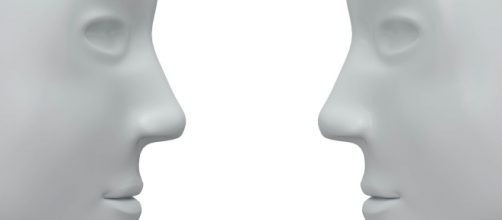Sometimes things come together in a glorious wreck. Such happenings are best imagined. We are doing a thinking exercise.
The most famous thing the 19th-century philosopher Kant did was to suggest we operate with what he called a Categorical Imperative. This translates into saying ethics, behavior, is the product of an inner urge, not some response to a general ontology. Are you confused? So am I. The reason is that the ontology from which he frees us is part of us. We are all part of being in the most general sense.
My suspicion is that Kant helped set in motion a sort of selfish (take that in two ways) view of ethics.
He made it possible for people, already fired up by superficial interpretations of Darwin, to give us a 20th century filled with the wreckage of people following their categorical imperatives.
Ontology
We cannot escape ontology. If we could there would have been no need for Jesus. My three philosophical precursors of triadic philosophy, C. S. Peirce, F. Nietzsche, and L. Wittgenstein each in their own way honored the place of Jesus in things. So did some of our US founders. So did some of the Enlightenment.
Kant's Moral Philosophy (Stanford Encyclopedia of Philosophy) https://t.co/U4aOFL2Pe6 pic.twitter.com/l6A5YnKYE3
— Stephen C. Rose (@stephencrose) November 27, 2017
These three men were profoundly influenced by Jesus as all should be.
If we can free ourselves from Christianity we can make mega-progress.
Ontology is the is the way things are, not something we need to escape to be ethical. Ethics is ontological values chosen by free persons. Morality is directly related to what we take to be universality, reality and ontology. This means that democracy, for example, is not a subjective choice. It is destiny. It depends on our choices and our choices are important, But it will come whether we choose it or not. The same is true of the values helpfulness and tolerance.
Kant would have been better off seeing conscience as our inner prompt to heed universal values than suggesting there is little or no need for one.
Will These Senators Live Up to Their Own Principles? https://t.co/uLn3887BNK
— Stephen C. Rose (@stephencrose) November 27, 2017
Categories
All this is by way of saying that we need to take the categories we live by and order them properly.
We need to understand that hurt and killing are the features of harm and that good is wellbeing, love, freedom devoid of harm. We need then to label things on their capacity to create tolerance, helpfulness and democracy. We now use Kantian methods to categorize things. Are they suitable for children? This is frankly disgusting. Harm is harm to any age, race, tribe, region -- to anyone.
This article can merely suggest where this is going. It is going into a global effort to free ourselves from me-thinking to the sort of thinking that emerges in the Lord's Prayer. Us thinking. We thinking. Social thinking. Thinking about this is a start.


